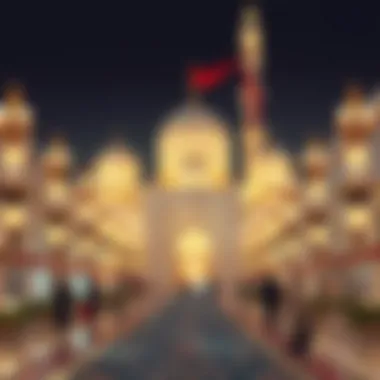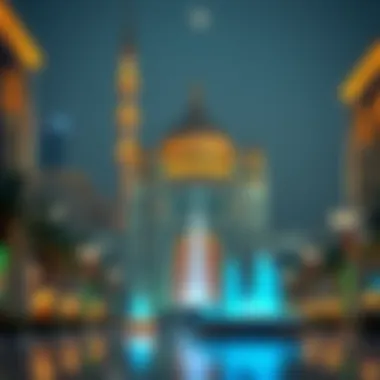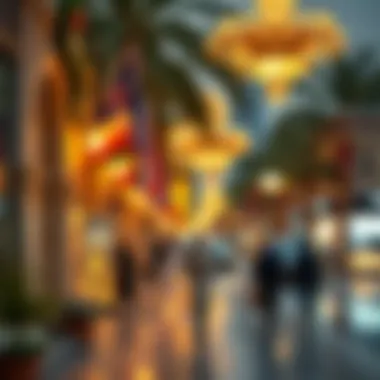Public Holidays in Dubai: Cultural Significance Revealed


Intro
Dubai, a melting pot of cultures and traditions, celebrates a tapestry of public holidays that hold immense significance for its diverse population. These holidays range from national days that foster a sense of unity to religious observances that reflect the profound spirituality of the city’s communities. Understanding the essence of these occasions offers more than just a glimpse into the local customs; it unveils the intricate social fabric that binds residents and expatriates alike.
In this exploration, we will delve into the various public holidays in Dubai, unraveling their historical roots and cultural impacts. Each holiday brings its own character and festivities, contributing to the vibrant atmosphere of the city. For investors, homebuyers, and expatriates, these celebrations can also influence local real estate trends and community dynamics.
This guide is designed to enrich your understanding of how public holidays shape the identity of Dubai, while also providing insights into the potential impacts on market trends and investment opportunities. Join us as we navigate through the significance and celebration of these important days.
Overview of Public Holidays in Dubai
Public holidays in Dubai are more than just days off work. They serve as a reflection of the city’s rich tapestry of culture and tradition. Understanding these holidays allows investors, homebuyers, agents, developers, and expatriates to grasp the local context better. It’s not just about leisure or shopping; these holidays contribute significantly to the economic and cultural landscape.
Cultural Context and Significance
In Dubai, public holidays often coincide with important cultural events and religious observances. Each holiday carries its weight, encapsulating centuries of history and the collective ethos of the Emirati people. For example, Eid al-Fitr marks the end of Ramadan, offering a chance to reflect on spirituality and community well-being.
These occasions provide individuals an opportunity to reconnect with their roots, fostering a sense of belonging in a rapidly modernizing society. The blend of tradition and contemporary life is palpable during these periods, making them essential highlights in the social calendar. Moreover, holidays like the Islamic New Year invite reflection on new beginnings, encouraging personal aspirations while aligning with familial and societal values.
The Role of Holidays in Society
Public holidays in Dubai are vital for social cohesion. They act as a platform for different cultural groups to come together, sharing their customs and traditions. These observances often prompt community activities, be it through local festivals or extensive family gatherings. Notably, the National Day celebrations exemplify national pride and community spirit, drawing both locals and expatriates into the festivities.
These holidays also impact daily life significantly, from influencing business hours to shaping the local economy. Local markets and real estate activity tend to spike during these times, highlighting the economic implications of public holidays. Businesses prepare special promotions or events to coincide with these celebrations, thereby capitalizing on increased foot traffic and tourism.
“Public holidays are not just a pause for work but a deep breath for culture, commerce, and community in Dubai.”
Main Public Holidays Celebrated in Dubai
Celebrating public holidays in Dubai is not merely about taking time off from work; it is deeply woven into the fabric of the society. These holidays serve as crucial moments for community bonding, cultural expression, and even economic stimulation. In a city where tradition melds seamlessly with modernity, understanding the significance of these holidays gives an insightful glimpse into the values that hold Dubai together.
National Day
History of National Day
Dubai's National Day, celebrated on December 2, marks the unification of the seven emirates in 1971. The historical backdrop of this date is rich; it symbolizes the end of British rule and the beginning of a new era characterized by unity and ambitions of development. It is a reminder of how far the nation has come since its early days, transforming from a small fishing village into a global hub. The unique feature of National Day lies in its ability to unite people from diverse backgrounds in a shared national identity. This ingrained sense of belonging makes it a key highlight for anyone diving into the essence of living in Dubai.
Celebration Activities
The festivities associated with National Day are nothing short of spectacular. Activities range from vibrant parades and firework displays to cultural shows that showcase Emirati heritage. What makes these activities appealing is how they manage to attract both locals and expatriates, fostering a spirit of inclusivity. Each celebration serves as a reminder of the rich cultural tapestry that defines Dubai. However, during this time, transport can be hectic, making it important for participants to plan ahead to enjoy the celebrations without a hitch.
Impact on Community Spirit
The National Day celebrations significantly boost community spirit as residents engage in various patriotic activities, such as decorating homes with national flags and joining in public festivities. This sense of community fosters friendships among neighbors and encourages social interactions. The palpable pride that is felt during this time makes it a worthy topic to explore for those keen on understanding the cultural underpinnings of Dubai.
Eid al-Fitr


Significance of Eid al-Fitr
Eid al-Fitr comes as a joyful culmination of Ramadan, the holy month of fasting. This holiday holds significant religious importance and allows families to come together in gratitude for the strength shown during fasting. The communal prayers performed at mosques and open spaces across Dubai serve as beautiful expressions of faith and unity. Highlighting this holiday's significance enables one to grasp the depth of spiritual practices ingrained in the lives of Muslim residents, making it a rich topic for exploration.
Traditions and Customs
Traditionally, Eid al-Fitr involves specific customs such as giving Zakat al-Fitr, which purifies the fast by giving to the less fortunate. The importance of these traditions lies in their ability to reinforce the value of charity and generosity within society. Culinary traditions also take center stage, with families preparing special dishes and sweets to share with friends and neighbors. This aspect of the holiday showcases the intersections of culture, religion, and social life in Dubai, making it a compelling aspect worth discussing.
Effect on Local Economy
The economic impact of Eid al-Fitr is significant. The holiday leads to increased spending in various sectors, especially retail and tourism. Shops often see a surge in customers purchasing gifts and new clothing to celebrate, further highlighting how these holidays stimulate the local economy. Understanding this relationship sheds light on how cultural events can serve as crucial economic drivers, underlining their importance in a city like Dubai, which thrives on both commerce and culture.
Eid al-Adha
Religious Importance of Eid al-Adha
Eid al-Adha, also known as the Festival of Sacrifice, commemorates the willingness of Ibrahim to sacrifice his son in obedience to God. This holiday holds a significant place in Islamic faith and serves as a reminder of obedience and devotion. The religious practices and sacrifices made during this time demonstrate the commitment of Muslims to their faith while further enriching the cultural landscape of Dubai.
Community Gatherings
During Eid al-Adha, communal gatherings become a wonderful feature of local life. Families and friends come together not only to share meals but also to participate in the annual sacrificial ritual, reinforcing communal ties. This aspect contributes to the sense of community, as actions taken during these gatherings highlight both compassion and the collective spirit. Exploring these gatherings provides insights into the cultural dynamics of the city and how they reinforce social bonds.
Real Estate Sector Influence
The effects of Eid al-Adha extend even into the real estate sector. Many expatriates choose this time to visit their home countries, leading to fluctuations in housing demands as landlords prepare for or accommodate temporary vacancies. Furthermore, the holiday often brings about new listings in the market, as families seek to relocate or upgrade their homes. Understanding these influences on the real estate market offers valuable information for investors and stakeholders in Dubai's rapidly evolving landscape.
Arafat Day
Observance of Arafat Day
Arafat Day occurs on the second day of the Hajj pilgrimage and is marked by solemnity and reflection. Many residents observe this day through fasting and attending prayers at mosques, emphasizing spiritual introspection. This day highlights the significance of devotion in Islam, making it a noteworthy occasion for both practicing Muslims and those interested in cultural practices.
Cultural Reflections
The observance on Arafat Day serves as a time to reflect on personal faith and community values. The cultural practice of gathering for prayers and engaging in charitable acts during this time strengthens community bonds and evokes a spirit of solidarity. This aspect cultivates a deeper understanding of Islamic values and how they underscore the social fabric of Dubai.
Holiday Activities
While Arafat Day itself is a time for contemplation, it is often followed by Eid al-Adha. The transition between these two days leads to unique holiday activities that forge a strong sense of community involvement. Participating in these experiences gives residents a chance to actively engage in their society while honoring their traditions, thus enriching their experience of living in Dubai.
Islamic New Year
Celebration of New Beginnings
The Islamic New Year symbolizes the beginning of a fresh chapter in the Hijri calendar. It is a time for renewal, reflection, and setting personal goals. This holiday, although less extravagantly celebrated than others, offers residents a chance to think about new aspirations and spiritual growth. The unique compactness of its observance reflects the blend of renewing familial ties and spiritual aspirations.
Rituals and Traditions


Different families practice varying traditions during Islamic New Year, reflecting the phrase 'every household has its own tales'. Some may choose to visit elders, while others engage in prayers or charitable activities. The diversity in practice illustrates the plurality within Islamic culture, enriching the broader dialogue about the nuances present in Dubai's public observances.
Impacts on Daily Life
The implications of the Islamic New Year on daily life include a shift in mindset, as many residents embrace the occasion to reset their daily habits and reinvigorate their goals. There may also be subtle shifts in workplaces to accommodate employees' reflections and personal development plans. Understanding these impacts provides crucial insights into the influence of cultural observances on individual lives and workplace dynamics in Dubai.
As public holidays shape not just the calendar year, but the very character of Dubai, they remain essential to understanding how this city functions and evolves. Through such occasions, the threads of tradition, community, and modernity are woven together, creating a vibrant tapestry that defines life in Dubai.
Public Holidays and Real Estate Market Dynamics
Public holidays in Dubai play a crucial role not just in cultural and religious observance, but also in the dynamics of the real estate market. These holidays can significantly impact buying trends, investment patterns, and market activities. Investors and potential homebuyers often adjust their strategies around these holidays, which can lead to noticeable spikes or drops in real estate activity. Understanding these patterns is essential for anyone looking to make informed decisions in Dubai's competitive property market.
Investment Trends during Holidays
During public holidays, the real estate market in Dubai often witnesses distinct investment trends. Due to a combination of cultural traditions and the influx of tourists and expatriates, certain periods can be viewed as prime opportunities for real estate transactions. For example, leading up to the Eid celebrations, many residents and expatriates tend to rethink their living arrangements. This season often prompts an uptick in demand for both rental and purchase properties.
- Holiday Promotions: Developers typically roll out special offers or discounts during holidays, piquing interest from potential buyers. These promotions can include waived fees, price reductions, or added amenities, making property more attractive.
- Increased Foot Traffic: With the streets buzzing and events taking place to celebrate, open houses or property shows during this period can draw larger crowds of interested buyers.
- Cultural Celebration Effects: Some investors see the connection between holidays and community engagement. They find that properties near celebration venues or family-friendly areas often rise in value, influencing their investment choices.
Market Activity Peaks and Lulls
Recognizing when market activity peaks and dips during public holidays can provide keen insights for potential investors and homebuyers. Understanding these ebbs and flows is key to crafting a savvy investment strategy.
- Peaks: Key holidays such as National Day or Eid al-Fitr typically mark periods of heightened activity. During these times, the market sees an influx of inquiries, and existing property listings may quickly transform into sold properties. Many buyers prefer finalizing their purchases before or just after the holiday to settle in or start renovations in anticipation of the new year.
- Lulls: Conversely, there are periods of relative inactivity. For example, right after large holidays, especially those involving significant travel and family gatherings, real estate activity may slow. People often prioritize settling back into their routines rather than making major decisions like buying a house or investing in properties.
Understanding these peak and lull times allows investors to plan their strategies effectively. As the old saying goes, "Timing is everything!" Investors can capitalize on the surge in interest leading up to holidays or be prepared for the quiet periods that follow.
- Key Insights:
- Identify peak times for buying based on public holidays.
- Take advantage of promotions strategically placed throughout the year
- Anticipate slower periods to prepare for subsequent investment opportunities.
Government Policies Relating to Holidays
Public holidays in Dubai are not just mere days off; they are woven into the very fabric of the city’s regulatory framework. The policy underpinning these holidays plays a crucial role in promoting national values, cultural heritage, and even economic stability. Understanding these policies gives insight into how holidays impact various sectors, especially when it comes to public and private entities.
Public Sector Holidays
In the public sector, holidays are officially dictated by the government, which sets the standard for holiday observance across governmental establishments. Eid celebrations, National Day, and other significant dates are mandated by law, allowing all public sector employees to partake without worry.
The government ensures that these holidays are consistent, reflecting significant cultural and religious observances. For instance:
- Eid al-Fitr and Eid al-Adha are designated as public holidays, with their dates calculated based on the lunar Islamic calendar.
- National Day, celebrated on December 2, is another major holiday, commemorating the UAE's formation.
These holidays are accompanied by a string of official activities, including parades, fireworks, and cultural events, which help to strengthen community ties and national pride. This observance is vital, as it creates a cohesive understanding of what it means to be part of the UAE, thereby promoting loyalty and unity among citizens and residents alike.
Private Sector Considerations
Contrastingly, the private sector experiences a bit more flexibility. While many companies recognize the same public holidays, the implementation may vary based on organizational policies. Employers often provide employees time off during these holidays, but the extent can depend on the company's nature.


Some important points regarding private sector practices include:
- Many multinational corporations align their holiday schedules with local public holidays to maintain a semblance of consistency for their workforce.
- For businesses directly linked to tourism or retail, they may opt to remain open during major holidays, as demand could peak during these times, especially in a city like Dubai.
- Employers may offer additional holiday benefits, such as paid leave on the day following Eid or even special bonuses to boost employee morale during festive seasons.
This nuanced understanding of holiday governance ensures that while the spirit of celebration is maintained, the operational realities of businesses are not compromised.
"The harmonization of public holidays within both the public and private sectors ensures an inclusive atmosphere, fostering community engagement and maintaining productivity across various industries."
Overall, the regulatory environment surrounding holidays in Dubai reflects its dynamic approach to balancing cultural observances with economic imperatives. This adaptability has allowed Dubai to stay a welcoming hub for both expatriates and tourists alike, making it a fascinating case study in holiday governance.
Relevant links
- Encyclopedia Britannica on UAE
- Wikipedia on Public Holidays in the UAE
- Government of Dubai FAQs
- Regulations and Guidance from UAE Government
This careful orchestration of public policies ensures that the celebration of holidays in Dubai transcends beyond just days off, intertwining with economic activity and social unity.
The Intersection of Tradition and Modernity
In Dubai, the blend of tradition and modernity is not merely an aesthetic choice; it reflects the ethos of a city that thrives on its historical roots while gleefully stepping into the future. Public holidays serve as focal points in this dynamic interplay. They are occasions where the echoes of the past resonate with the pulse of contemporary life, necessitating an exploration of their significance and activities within the local context.
Cultural Preservation
With each public holiday, Dubai not only commemorates its traditions but also actively preserves them for future generations. Take, for instance, National Day. This day marks the unification of the emirates and holds tremendous significance for locals. Celebrations on this day are steeped in cultural practices—from traditional dances and music to art displays featuring local craftsmanship.
Each of these expressions acts as a bridge connecting the past with the present. Families gather to cherish their heritage, where storytelling and folklore come alive, reinforcing a sense of identity in an otherwise fast-paced, modern world. The festivals are peppered with local delicacies, bringing flavors of the emirate's history to each table.
Moreover, the approach to public holidays is not just about looking back; it’s also about embracing advancements. For example, electronic platforms are increasingly being used to disseminate information about traditional practices, ensuring that they reach younger audiences in a palatable format. This tech-savvy approach keeps traditions vibrant in a digital age, which is essential for maintaining relevance.
Influence of Expat Community
While the indigenous population plays a central role in shaping the cultural festivities, the expat community adds rich, diverse textures to the holiday tapestry. Dubai’s public holidays provide a unique stage for expatriates to participate in and contribute to cultural celebrations. Events organized during Eid al-Fitr and Eid al-Adha often see participation from individuals representing various nationalities, creating a melting pot of customs and practices.
For expatriates, these holidays offer a chance to embrace and learn about the local culture. Activities such as communal iftars during Ramadan or public street fairs help foster connections among residents, regardless of their backgrounds. Many expats volunteer during local events, showcasing a willingness to engage deeply with their host city.
This interaction benefits not just community bonds but also contributes to the local economy, as maiintaining vibrancy in form of workshops and cultural events attracts tourists and locals alike. The presence of expats has even prompted more inclusive resident-led initiatives that celebrate multi-national backgrounds with unique twists on traditional holidays, exhibiting how modern influences can complement and enrich time-honored customs.
Future of Public Holidays in Dubai
The future of public holidays in Dubai is as significant as the city itself, marrying tradition with the ever-evolving cultural landscape. As the region adapts to global changes and increasing diversification, understanding how public holidays may evolve presents critical insights for investors, homebuyers, and expatriates alike. The implications of these changes can affect economic activities, community engagement, and even real estate investment trends in the city.
Potential Changes in Holiday Practices
With the rise in Dubai’s population, which includes a substantial expatriate community, holiday practices are likely to undergo some transformations. Some potential changes to watch out for include:
- Inclusion of New Holidays: Given the large expat population, there may be a push for the recognition of holidays from different cultures, helping bridge gaps and foster unity within the community.
- Shifting Celebration Methods: As more global influences penetrate local culture, the ways in which holidays are celebrated may become more varied. Digital celebrations could surge, making distance less of a barrier for expatriates wishing to partake.
- Focus on Sustainability: With global emphasis on environmental awareness, holidays might see more eco-friendly celebrations. This could mean fewer lavish fireworks and more investments in public celebrations that promote sustainability, which aligns well with Dubai's Vision 2021 goals.
It’s also essential to consider how technological advancements will shape these practices. Virtual reality, for instance, could allow individuals to join celebrations from anywhere in the world, creating a hybrid approach to traditional festivities.
Impact on the Real Estate Sector
The impacts of changing holiday practices on Dubai’s real estate market are particularly noteworthy. As public holidays evolve, so too will property demands and values. Here are a few considerations:
- Increase in Short-term Rentals: As holidays become more inclusive and recognized globally, Dubai could see an uptick in tourists during these periods. This may encourage investors to consider short-term rental properties, catering to holiday-goers, thereby enhancing profitability and market activity.
- Shifts in Commercial Demand: Businesses gearing up for holiday celebrations might require commercial spaces tailored to their specific needs. For instance, pop-up markets themed around diverse cultural holidays could spur demand for flexible retail spaces.
- Negative or Positive Market Sentiment: Depending on how inclusive or well-received changes are, there could be varying impacts on consumer confidence in real estate investments. A welcoming approach could lead to positive sentiments and heightened demand, whereas resistance to changes might create hesitation in the market.



